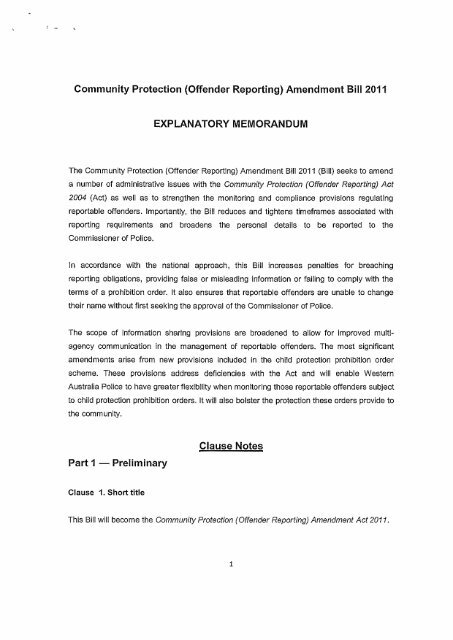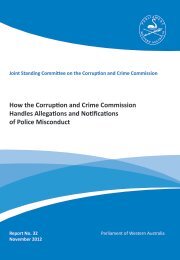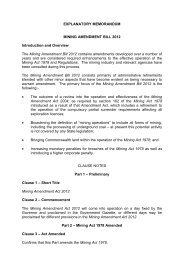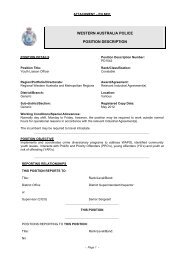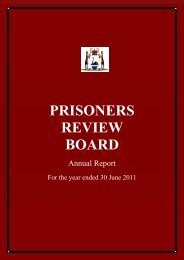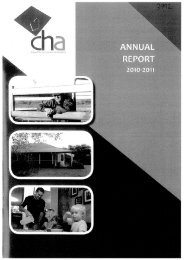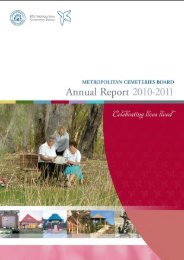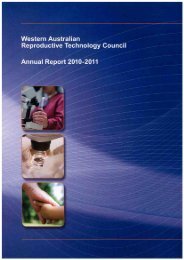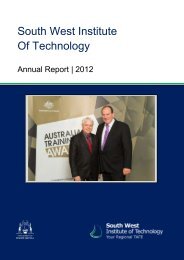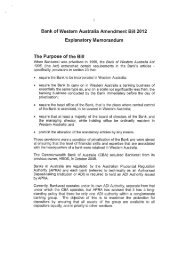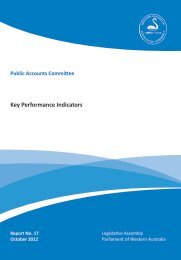Community Protection (Offender Reporting) Amendment Bill 2011 ...
Community Protection (Offender Reporting) Amendment Bill 2011 ...
Community Protection (Offender Reporting) Amendment Bill 2011 ...
Create successful ePaper yourself
Turn your PDF publications into a flip-book with our unique Google optimized e-Paper software.
<strong>Community</strong> <strong>Protection</strong> (<strong>Offender</strong> <strong>Reporting</strong>) <strong>Amendment</strong> <strong>Bill</strong> <strong>2011</strong><br />
EXPLANATORY MEMORANDUM<br />
The <strong>Community</strong> <strong>Protection</strong> (<strong>Offender</strong> <strong>Reporting</strong>) <strong>Amendment</strong> <strong>Bill</strong> <strong>2011</strong> (<strong>Bill</strong>) seeks to amend<br />
a number of administrative issues with the <strong>Community</strong> <strong>Protection</strong> (<strong>Offender</strong> <strong>Reporting</strong>) Act<br />
2004 (Act) as well as to strengthen the monitoring and compliance provisions regulating<br />
reportable offenders. Importantly, the <strong>Bill</strong> reduces and tightens timeframes associated with<br />
reporting requirements and broadens the personal details to be reported to the<br />
Commissioner of Police.<br />
In accordance with the national approach, this <strong>Bill</strong> increases penalties for breaching<br />
reporting obligations, providing false or misleading information or failing to comply with the<br />
terms of a prohibition order. It also ensures that reportable offenders are unable to change<br />
their name without first seeking the approval of the Commissioner of Police.<br />
The scope of information sharing provisions are broadened to allow for improved multiagency<br />
communication in the management of reportable offenders. The most significant<br />
amendments arise from new provisions included in the child protection prohibition order<br />
scheme. These provisions address deficiencies with the Act and will enable Western<br />
Australia Police to have greater flexibility when monitoring those reportable offenders subject<br />
to child protection prohibition orders. It will also bolster the protection these orders provide to<br />
the community.<br />
Clause Notes<br />
Part 1<br />
Preliminary<br />
Clause 1. Short title<br />
This <strong>Bill</strong> will become the <strong>Community</strong> <strong>Protection</strong> (<strong>Offender</strong> <strong>Reporting</strong>) <strong>Amendment</strong> Act <strong>2011</strong>.<br />
1
Clause 2. Commencement<br />
This clause provides that Part I of the <strong>Bill</strong> will commence operation when the Act receives<br />
the Royal Assent.<br />
The remainder of the <strong>Bill</strong> will commence operation on a day to be fixed by proclamation. This<br />
is to enable the drafting of the regulations required to give full effect to other clauses of the<br />
<strong>Bill</strong> and to allow the Western Australia Police to undertake the measures necessary to<br />
ensure its operational readiness.<br />
Part 2 <strong>Community</strong> <strong>Protection</strong> (<strong>Offender</strong> <strong>Reporting</strong>) Act 2004<br />
amended<br />
Division 1 Main amendments<br />
Clause 3. Act amended<br />
The clauses contained in this Part amend the <strong>Community</strong> <strong>Protection</strong> (<strong>Offender</strong> <strong>Reporting</strong>)<br />
Act 2004.<br />
Clause 4. Section 3 amended<br />
This clause amends two definitions found in section 3 of the <strong>Community</strong> <strong>Protection</strong> (<strong>Offender</strong><br />
<strong>Reporting</strong>) Act 2004 (Act).<br />
The definition of 'past offender reporting order' is amended so that provision is made for<br />
proposed section 20A.<br />
The definition of 'public authority' is deleted in its entirety and replaced with a definition<br />
which more accurately describes a 'public authority'. The existing definition does not include<br />
office holders and this has caused information sharing issues for the purposes of monitoring<br />
reportable offenders.<br />
2
Clause 5. Section 7 amended<br />
Section 7, read in conjunction with section 49 of the Act, sets out the reporting period for<br />
corresponding reportable offenders This clause seeks to clarify the provision by amending<br />
section 7(b)(i) of the Act to replace the words 'longer period than he or she would be<br />
required to report under this Act; or' with the words 'particular period; or' so that reference to<br />
the particular reporting period in a foreign jurisdiction is clearly reflected.<br />
Clause 6. Section 13 amended<br />
Section 13 of the Act currently allows the Court to order a person, who would otherwise not<br />
be a reportable offender, to come within the scope of the Act. This is done by way of the<br />
Court making an offender reporting order at the time the person is sentenced for an offence<br />
that is not a Class 1 or Class 2 offence. Clause 6 amends section 13 of the Act so that, in<br />
addition to being able to make an order at sentencing, the Court can make an offender<br />
reporting order at a later time.<br />
Proposed section 13(7A) enables the Commissioner to apply to the Court to make an<br />
offender reporting order within the period of 6 months after the person is sentenced for the<br />
offence. If the person is in government custody it will be open for the Commissioner to apply<br />
to the Court to make an offender reporting order within the period from when the person is<br />
sentenced for the offence up until within 6 months after the person ceases to be in<br />
government custody inclusive of the period spent in custody.<br />
Proposed section 13(7B) ensures that if an application is made for an offender reporting<br />
order, the reference to the 'prosecution' found in section 13(4)(b) of the Act is taken to<br />
include a reference to the Commissioner.<br />
Proposed section 13(7C) ensures that the procedures for an application for a past offender<br />
reporting order found in sections 16, 17, 18, 20 and 21 of the Act are applicable to an<br />
application for an offender reporting order made under proposed sub-section (7A).<br />
Clause 7. Section 14A inserted<br />
This clause inserts a new section into Part 2 Division 1 so that offender reporting orders can<br />
be made by consent. Proposed section 14A will enable the Court to make an offender<br />
3
eporting order without going through the Court process in full [as set out in section 13 of the<br />
Act] if the applicant and the offender both consent to the making of the order.<br />
Clause 8. Section 17 amended<br />
This clause makes two key amendments to section 17 of the Act which governs the giving of<br />
evidence at hearings for past offender reporting orders.<br />
Firstly, it enables an affidavit used in a hearing for a past offender reporting order to include<br />
evidence that the person making it could give orally except that it may contain statements<br />
based on information and belief if the person making the affidavit states the source of the<br />
information and the grounds for the belief. This will enable evidence to be given which refers<br />
to such documents as pre-sentence reports, psychological assessments and information<br />
reports which assist with establishing that a person does or does not pose a risk to the lives<br />
or sexual safety of one or more persons or persons generally.<br />
Secondly, this clause enables the Commissioner to, for the purposes of a past offender<br />
reporting order application, inspect or obtain a copy of any document relating to the<br />
respondent held by the Children's Court that is part of the Court record or that was received<br />
by that Court in sentencing proceedings. As it currently stands, section 51A(3) of the<br />
Children's Court of Western Australia Act 1988 allows access to that Court's records for the<br />
purposes of criminal proceedings only. A past offender reporting<br />
order hearing is not a<br />
criminal proceeding and as such, section 51A(3) restricted the Commissioner's ability to<br />
obtain documents held by the Children's Court for use in a past offender reporting order<br />
application.<br />
Clause 9. Section 19 amended<br />
Section 19 of the Act relates to the power of Courts to make past offender reporting orders.<br />
Sub-clause (1) provides greater clarity by amending section 19(1) of the Act to specify that<br />
the person who is the subject of an order is a 'past offender'.<br />
Currently, for offender reporting orders made pursuant to section 13(4) of the Act, matters<br />
are listed which the Court may have regard to when making such an order. However, no<br />
such matters are listed for the purposes of a past offender reporting order. Sub-clause (2)<br />
4
emedies this issue by inserting matters which the Court may have regard to when making a<br />
past offender reporting order. These matters are:<br />
any evidence given during proceedings for the offence;<br />
any document or record (including an electronic document or record) served on the<br />
past offender by the prosecution or the Commissioner;<br />
any statement tendered, or deposition made, or exhibit tendered, at any proceedings<br />
in relation to the offence;<br />
the period of time since the offence was committed;<br />
the age of the past offender and the age of any victim of the offence at the time the<br />
offence was committed;<br />
the difference in age between the past offender and any victim of the offence;<br />
the seriousness of the past offender's total criminal record; and<br />
any other matter the Court considers relevant.<br />
This sub-clause also inserts proposed sub-section (3B) so that the Court can consider spent<br />
convictions as a part of the past offender's total criminal record for the purposes of making a<br />
past offender reporting order.<br />
Clause 10. Section 20A inserted<br />
This clause inserts proposed section 20A so that past offender reporting orders can be made<br />
by consent of the parties without being subject to section 19 of the Act.<br />
Clause 11. Section 22 amended<br />
Section 22 of the Act provides a right of appeal against past offender reporting orders. This<br />
clause clarifies that a person aggrieved by the decision of a Court made under section 19 of<br />
the Act may appeal that decision, but that no appeal lies against consent orders made under<br />
proposed new section 20A.<br />
Clause 12. Section 24 amended<br />
Section 24 of the Act sets out when a reportable offender must report his or her details to the<br />
Commissioner. This clause inserts a new sub-section (2A) to clarify that a reportable<br />
offender who must comply with the reporting obligations of this Act because of the making of<br />
5
an offender reporting order or a past offender reporting order must report his or her personal<br />
details to the Commissioner within 7 days after the order is made or, if he or she is in<br />
government custody, within 7 days after ceasing to be in government custody.<br />
Clause 13. Section 26 amended<br />
This clause makes several amendments to section 26 of the Act. Section 26 of the Act lists<br />
the personal details which must be reported to the Commissioner by the reportable offender.<br />
Sub-clause (1) inserts additional personal details which the reportable offender must report<br />
as follows:<br />
details of any passport that he or she holds, including its number and expiry date<br />
and the name of the country that issued it; and<br />
any user name, code, password or other information that he or she uses to gain<br />
access to:<br />
o the Internet generally or a particular website, other than a website operated<br />
by a financial institution or a website approved by the Commissioner; and<br />
o an email address or a communication service;<br />
the address of each of the premises at which he or she is regularly present and any<br />
children generally reside.<br />
Sub-clause (2) enables the Commissioner to, at the written request of a reportable offender,<br />
approve a website used by the offender if the Commissioner is satisfied that the website is<br />
used by the offender only for lawful purposes in connection with recording financial<br />
information or making financial transactions.<br />
Sub-clause (3) will reduce the timeframes provided in section 26(2) of the Act as follows:<br />
section 26(2)(a) provides that a reportable offender does not generally reside at any<br />
particular premises unless he or she resides at those premises for at least 14 days<br />
(whether consecutive or not) in any period of 12 months. This is reduced to 7 days.<br />
section 26(2)(b) provides that a child does not generally reside in the same<br />
household as a reportable offender unless they reside together in the same<br />
household for at least 14 days (whether consecutive or not) in any period of 12<br />
months. This is reduced to 3 days.<br />
6
section 26(2)(c) provides that a reportable offender does not have regular<br />
unsupervised contact with a child unless he or she has regular unsupervised contact<br />
with the child for at least 14 days (whether consecutive or not) in any period of 12<br />
months. This is reduced to 3 days.<br />
section 26(2)(d) provides that a reportable offender is not generally employed at any<br />
particular premises unless he or she is employed at those premises for at least 14<br />
days (whether consecutive or not) in any period of 12 months. This is reduced to 7<br />
days.<br />
section 26(2)(e) provides that a reportable offender does not generally drive a<br />
particular motor vehicle unless the person drives that vehicle for at least 14 days<br />
(whether consecutive or not) in any period of 12 months. This is reduced to 7 days.<br />
New timeframes are also inserted in section 26(2) as follows:<br />
a reportable offender is not regularly present at any premises unless he or she is<br />
present at those premises for at least 7 days (whether consecutive or not) in any<br />
period of 12 months; and<br />
a child does not generally reside at any premises unless he or she resides at those<br />
premises for at least 3 days (whether consecutive or not) in any period of 12 months.<br />
Clause 14. Section 29 amended<br />
This clause reduces the reporting timeframes provided in section 29 of the Act that apply to<br />
changes to a reportable offender's personal details.<br />
If a reportable offender has a change in his or her personal details for the place where he or<br />
she or a child generally resides, or when he or she has unsupervised contact with a child,<br />
then that change will need to be reported within 24 hours after that change occurs. This<br />
dramatically reduces the current time period of 7 days.<br />
Section 29(2) of the Act provides clarification as to when a change in personal details<br />
occurs. Clause 14(2) inserts a new subclause into section 29(2) of the Act to include<br />
reference to when a reportable offender is present at a place. It also amends section 29(2) to<br />
reflect the new timeframes in section 26 of the Act [see clause 13 of the <strong>Bill</strong>] so that the 7<br />
day period or 3 days period referred to in amended section 26 are stated.<br />
7
Clause 15. Section 37 amended<br />
Section 37 of the Act requires the authorised person receiving the report of personal details<br />
from the reportable offender to provide the reportable offender with an acknowledgement of<br />
that report. Clause 15 removes the requirement for a written acknowledgement to be<br />
provided for reports other than the initial report under section 26 of the Act. This gives full<br />
effect to section 37(4) of the Act so that the Commissioner and the reportable offender may<br />
make an agreement as to the manner in which an acknowledgement is given. This clause<br />
does not alter Western Australia Police practices to record and retain all reports made<br />
pursuant to the Act.<br />
Clause 16. Section 38 amended<br />
Clause 16 amends section 38 to reflect the amendment to section 26(1) made by clause 13.<br />
This proposed amendment will delete section 38(1)(a) and instead specify that a reportable<br />
offender must, to verify or support details in the report, present for inspection any passport<br />
that the reportable offender holds. If the reportable offender does not hold a passport then<br />
the reportable offender must present a form of identification or other document relating to the<br />
identity of the reportable offender as specified by the regulations.<br />
Clause 17. Section 40 amended<br />
Section 40 enables a reportable offender to be photographed when they are reporting to<br />
police. This clause amends section 40 so that an authorised person will have the power to<br />
photograph any premises or vehicle included in the personal details reported by a reportable<br />
offender. However, this power does not confer a power on an authorised person to enter any<br />
premises or vehicle.<br />
Clause 18. Section 41 amended<br />
Section 41 authorises and regulates the use of reasonable force in the exercise of taking<br />
photographs under section 40 or taking fingerprints under section 39. Clause 18 amends<br />
section 41 in reference to the amendment by clause 17 to section 40 so that the power to<br />
photograph a premises or vehicle will be subject to section 41.<br />
Clause 19. Section 49 amended<br />
8
Section 49 of the Act prescribes the reporting period for corresponding reportable offenders.<br />
This clause amends section 49 so that it clearly provides a corresponding reportable<br />
offender will have to report for whichever period is the longer period. This will either be the<br />
recognised foreign reporting period as specified by section 7(b)(i) or the period that, apart<br />
from section 49, he or she would be required to re port under the Act.<br />
Clause 20. Section 62 amended<br />
Section 62 of the Act provides that revocation of the suspension of reporting obligations only<br />
happen in certain circumstances. The Commissioner of Police does not currently have any<br />
power to revoke such suspension. Clause 20 enables the Commissioner of Police to, after<br />
approving the suspension of a reportable offender's reporting obligations under Division 7 of<br />
the Act, revoke that suspension if the Commissioner is no longer satisfied that the reportable<br />
offender does not pose a risk to the lives or the sexual safety of one or more persons, or<br />
persons generally. The Commissioner must give the reportable offender written notice that<br />
the suspension has been revoked for it to have effect.<br />
Clause 21. Section 63 amended<br />
Section 63 of the Act makes it an offence for a reportable offender to fail to comply with their<br />
reporting obligations under the Act. This is currently a simple offence and the penalty is<br />
imprisonment for up to 2 years and a fine of up to $12 000.<br />
This clause designates the offence in section 63 of the Act as a crime and increases the<br />
penalty to imprisonment for 5 years. A proposed new summary conviction penalty will be a<br />
fine of $12 000 and imprisonment for 2 years.<br />
Clause 22. Section 64 amended<br />
Section 64 of the Act makes it an offence for a person to provide false or misleading<br />
information. This is currently a simple offence and the penalty is imprisonment for up to 2<br />
years and a fine of up to $12 000.<br />
9
This clause designates the offence in section 64 of the Act as a crime and increases the<br />
penalty to imprisonment for 5 years. A proposed new summary conviction penalty will be a<br />
fine of $12 000 and imprisonment for 2 years.<br />
Clause 23. Part 4A inserted<br />
Clause 23 inserts a new Part 4A into the Act. This new Part 4A will apply to all reportable<br />
offenders who apply to the Registrar of Births, Deaths and Marriages to change their name<br />
pursuant to the Births, Deaths and Marriages Registration Act 1998.<br />
Proposed section 80A<br />
This proposed section creates key definitions for use in this Part.<br />
Proposed section 80B<br />
This proposed section provides that Part 4A will apply despite anything to the contrary in the<br />
Births, Deaths and Marriages Registration Act 1998 (Registration Act).<br />
Proposed section 80C<br />
This proposed section specifies that a reportable offender must obtain the written approval of<br />
the Commissioner prior to:<br />
applying to the WA Registrar to register a change of his or her name under the<br />
Registration Act; or<br />
applying to an interstate Registrar to register a change of his or her name under a<br />
law of another State or a Territory that is the equivalent of the Registration Act,<br />
In the event this requirement is breached, a penalty of a fine of $12 000 and imprisonment<br />
for 2 years will apply.<br />
This proposed section also specifies that a person must not change a reportable offender's<br />
name on the reportable offender's behalf without first obtaining the written approval of the<br />
Commissioner.<br />
A penalty of a fine of $12 000 and imprisonment for 2 years accompanies this provision.<br />
10
Proposed section 80D<br />
This proposed section regulates how a person may apply to the Commissioner for approval<br />
of a change of name application.<br />
Firstly, it specifies that the application must be made in a manner approved by the<br />
Commissioner. Once the Commissioner receives the application, he may approve a change<br />
of name application only if satisfied that the change of name is in all the circumstances<br />
necessary or reasonable.<br />
Secondly, proposed section 80D provides that the Commissioner must not approve a<br />
change of name application if he is satisfied that the change of name would, if registered, be<br />
reasonably likely:<br />
to be regarded as offensive by a victim of crime or a significant sector of the<br />
community; or<br />
to frustrate the administration of the Act in respect of the reportable offender who is<br />
the subject of the change of name application.<br />
If the Commissioner approves a change of name application, proposed section 80D provides<br />
that the Commissioner must:<br />
as soon as is practicable, give written notice of the approval to the person who made<br />
the application; and<br />
give a copy of the written notice of approval to the WA Registrar or the interstate<br />
Registrar, as the case requires.<br />
Proposed section 80E<br />
Proposed section 80E applies to the Registrar of Births, Deaths and Marriages (the WA<br />
Registrar). It provides that the WA Registrar must not register a change of name under the<br />
Registration Act if:<br />
the WA Registrar knows that the change of name relates to the name of a reportable<br />
offender; and<br />
the WA Registrar has not received a copy of the written notice of approval of the<br />
Commissioner under proposed section 80D.<br />
11
In the event the WA Registrar does not register a change of name because he knows that<br />
the change of name relates to the name of a reportable offender and he has not received a<br />
copy of the written notice of approval under proposed section 80D, then he must notify the<br />
Commission in writing that the application has been made.<br />
Proposed section 8OF<br />
This proposed section provides a definition of the 'Registration Act Register', namely that it is<br />
the Register referred to in the Registration Act section 49(1)'.<br />
This proposed section authorises the WA Registrar to correct the Registration Act if he<br />
knows that the name of a reportable offender on the Registration Act Register has been<br />
changed and the Commissioner has not approved that change. This proposed section does<br />
not limit section 51 of the Registration Act nor does it allow for retrospectivity.<br />
Proposed section 80G<br />
In order for the WA Registrar to have knowledge under proposed section 80E, proposed<br />
section 80G authorises the Commissioner to notify the WA Registrar:<br />
of the name (including any other name by which the reportable offender is or has<br />
previously been known of which the Commissioner is aware) and date of birth of<br />
every reportable offender; and<br />
of an application made to the Commissioner to approve a change of name<br />
application.<br />
This notification is mandatory.<br />
Further, without limiting proposed section 80E(2), this proposed section authorises the WA<br />
Registrar to notify the Commissioner of an application made to the WA Registrar to register<br />
a change of name that the WA Registrar suspects may relate to the name of a reportable<br />
offender.<br />
Proposed sections 80G(3) and (4) provide that the WA Registrar must maintain the<br />
confidentiality of any information given by the Commissioner under this proposed Part and<br />
that this proposed section has effect despite any written or other law to the contrary.<br />
12
Clause 24. Section 80 amended<br />
Section 80 of the Act contains the requirement to establish and maintain the <strong>Community</strong><br />
<strong>Protection</strong> <strong>Offender</strong> Register. Clause 24 expands section 80(2)(d) to include reference to a<br />
protection order under the Act or a supervision order under the Dangerous Sexual<br />
<strong>Offender</strong>s Act 2006. This means that if a reportable offender is subject to one of those<br />
orders, details of those orders are included in the Register<br />
Clause 25. Section 82 amended<br />
Section 82(1) of the Act sets out the confidentiality provisions that apply to the Act. Clause<br />
25 amends section 82 to include reference to proceedings on an application for, or for the<br />
variation or revocation of, a protection order.<br />
Clause 26. Section 85 amended<br />
Section 85 sets out the terms used in Part 5. Clause 26 inserts a new definition for the term<br />
'authorised police officer' which is a 'police officer authorised in writing by the Commissioner<br />
for the purposes of the provision in which the term is used'. The definition has relevance for<br />
proposed new sections 94B and 94C of the Act [contained in clause 33 of the <strong>Bill</strong>].<br />
Clause 27. Section 86 amended<br />
Clause 27 amends section 86, which governs the giving of evidence at hearings for<br />
prohibition orders, so that an affidavit for use in the hearing of a child protection prohibition<br />
order (to be renamed 'child protection order' with the shortened reference being 'protection<br />
order' as per clause 41) must be confined to the evidence the person making it could give<br />
orally, except that it may contain statements based on information and belief if the person<br />
making the affidavit states the source of the information and the grounds for the belief.<br />
Clause 27 will also enable the Commissioner to, for the purposes of a protection order<br />
application, inspect or obtain a copy of any document relating to the respondent held by the<br />
Children's Court that is part of the Court record or that was received by that Court in<br />
sentencing proceedings.<br />
13
Clause 28. Section 87 replaced<br />
Section 87 enables the Commissioner to apply to the Court for an order which prohibits a<br />
reportable offender from engaging in certain types of behaviour or from certain lawful<br />
activities. The <strong>Bill</strong> proposes to expand this legislative scheme so that a protection order can<br />
both prohibit a reportable offender from engaging in specified conduct or can require the<br />
offender to comply with certain orders.<br />
Clause 28 achieves this by deleting section 87 and replacing it with a new provision which<br />
provides that the Commissioner may apply to a Court for a protection order which:<br />
prohibits a reportable offender from engaging in specified conduct; or<br />
requires a reportable offender to comply with the orders of the Commissioner, as<br />
referred to in proposed section 94A [see clause 33 of the <strong>Bill</strong>]; or<br />
both the above.<br />
Clause 28 also specifies that if the reportable offender is in government custody, then an<br />
application may be made for an interim protection order, but only if the offender is expected<br />
to be released from government custody within the period of 30 days after the application is<br />
made.<br />
Clause 29. Section 90 amended<br />
Sub-clause (1) removes reference to the prohibition requirement in section 90 of the Act to<br />
allow for section 90 to be used for both prohibiting conduct and compelling certain conduct.<br />
Sub-clause (2) inserts a new proposed section 90(3)(ga) so that the Court may take into<br />
account any document or record (including an electronic document or record) served on the<br />
reportable offender by the Commissioner when determining whether to make a protection<br />
order.<br />
Clause 30. Section 91 amended<br />
Section 91 of the Act currently places limits on the length of prohibition orders and sets a<br />
maximum of 5 years for adult offender and 2 years for young reportable offenders. Clause<br />
30 deletes section 91(2) and replaces it with a new provision which gives the Court more<br />
flexibility when determining the term for which a child protection order remains in force. This<br />
14
will enable the Court to make a child protection order for any period of time but cannot<br />
extend beyond the reporting period that applies to the reportable offender.<br />
Clause 31. Section 92 amended<br />
Section 92 of the Act enables a Court to make an interim child protection prohibition order.<br />
Clause 31(1) deletes section 92(1) of the Act and replaces it with a broader provision. Whilst<br />
this clause retains the requirement in the current section 92(1) that an interim protection<br />
order can be made if it is necessary to do so to prevent an immediate risk to the lives or<br />
sexual safety of one or more children, or children generally, it includes a specific reference to<br />
obtaining an interim child protection order whilst a reportable offender is still in government<br />
custody in circumstances where the making of the order will prevent an immediate risk to the<br />
lives or the sexual safety of one or more children, or children generally upon that offender's<br />
release from government custody.<br />
Sub-clause (2) inserts a proposed subsection to enable the Court, after sentencing a<br />
reportable offender for an offence, to hear an application for an interim protection order; and<br />
dispose of the application in accordance with section 89 of the Act.<br />
Sub-clause (3) amends section 92(5)(a) to make an allowance for the possibility of an<br />
interim protection order being made in circumstances where the reportable offender is in<br />
government custody.<br />
Sub-clause (4) provides that if the reportable offender is in government custody when an<br />
interim protection order is made, the Court must fix the further hearing of the application for a<br />
time after the offenders release from government custody.<br />
Clause 32. Section 93 amended<br />
Section 93 of the Act sets out the conduct that may be the subject of a prohibition order.<br />
Clause 32(1) deletes section 93(1)(c) and inserts provisions which will broaden the scope of<br />
the proposed new protection orders. These provisions will enable the Court to prohibit a<br />
reportable offender from:<br />
residing at a specified place;<br />
15
changing the place where he or she generally resides (as described in proposed<br />
section 29A(1)) without first having obtained the permission of the Commissioner to<br />
do so;<br />
travelling out of Australia without first having obtained the permission of the<br />
Commissioner to do so;<br />
consuming or using alcohol, drugs or other specified substances; and<br />
engaging in other specified behaviour.<br />
Sub-clause (2) clarifies reference in section 93(4) to 'a place' so that 'a place' includes a<br />
place where the reportable offender the subject of the protection order application resides.<br />
Sub-clause (3) inserts a proposed section 93(6) which specifies that a protection order may,<br />
in addition to or instead of prohibiting conduct, impose requirements on a reportable offender<br />
as the Court considers appropriate to reduce the risk posed by the reportable offender to the<br />
lives or sexual safety of one or more children, or children generally.<br />
Clause 33. Sections 94A, 94B and 94C inserted<br />
Clause 33 inserts proposed sections 94A 94C into Part 5 Division 2 of the Act.<br />
Proposed section 94A<br />
Proposed section 94A enables the Court to order, as part of a reportable offenders<br />
protection order, that the reportable offender comply with the orders of the Commissioner as<br />
to undergoing assessment by a medical practitioner, a psychiatrist, a psychologist or a<br />
social worker, or more than one of them and, if necessary, undergo appropriate treatment.<br />
This proposed section states that the Commissioner must not order a reportable offender to<br />
undergo treatment of any sort unless a person qualified to recommend or administer the<br />
treatment has recommended that the offender undergo that treatment. It also ensures that a<br />
person cannot administer treatment of any sort that is the subject of an order of the<br />
Commissioner without the informed consent of the reportable offender who is to undergo the<br />
treatment.<br />
Provision is made for when it may be necessary for treatment to cease. This occurs when:<br />
16
the Commissioner, on the recommendation of the person administering the treatment<br />
(if applicable), gives the offender notice to that effect; or<br />
the protection order, or the requirement imposed by the protection order, ceases to<br />
be in force, whichever happens first.<br />
Proposed section 94A(5) enables regulations to be made on the following matters:<br />
for the authorisation of absences from assessment or treatment;<br />
to regulate the consequences of injury or sickness with respect to complying with the<br />
orders of the Commissioner;<br />
to prescribe the matters that a person providing assessment or administering<br />
treatment for the purposes of a protection order must report to the Commissioner;<br />
provide for the variation of protection orders in relation to reportable offenders:<br />
o who fail to comply with the orders of the Commissioner; or<br />
o whose compliance with those orders is affected by an authorised absence,<br />
injury or sickness,<br />
including any variation of protection orders by the imposition of additional<br />
requirements on those offenders; and<br />
to authorise the Commissioner to approve forms for the purposes of this proposed<br />
subsection.<br />
There is no offence which accompanies a breach of an order of the Commissioner to<br />
undergo assessment by a medical practitioner, a psychiatrist, a psychologist or a social<br />
worker, and if necessary, undergo appropriate treatment. In the event a reportable offender<br />
fails to comply with such an order, the reportable offender's protection order may be varied<br />
accordingly.<br />
Proposed section 94B<br />
Proposed section 94B enables authorised police officers to test a reportable offender for<br />
alcohol, drugs or other specified substances in circumstances where the consumption of<br />
such substances has been prohibited as part of the offender's child protection order.<br />
Additionally, if a reportable offender is required to comply with an order of the Commissioner<br />
to undergo treatment that consists of or includes the taking of any specified medications, an<br />
authorised police officer may exercise the powers contained within section 94B to assess the<br />
reportable offender's compliance with their order.<br />
17
Specifically, proposed section 94B enables authorised police officers to require a reportable<br />
offender submit to a breath test or an oral fluid test or give a sample of his or her blood, hair,<br />
urine or oral fluid for analysis in order to determine whether there is any evidence that the<br />
person has breached the order.<br />
If an authorised police officer makes a requirement for the offender to give a sample of his or<br />
her blood, hair, urine or oral fluid for analysis, then the authorised officer must either state<br />
that the reportable offender is to accompany a police officer to a police station or other<br />
specified place, such as a hospital, or specify the day, time and place where the offender is<br />
to give the sample and indicate what type of sample or samples are required to be given.<br />
The ability for the authorised officer to require a reportable offender to accompany a police<br />
officer to a police station or other specified place is importantimmediate compliance may<br />
be required in situations where a reportable offender is suspected of consuming a substance<br />
which has a limited timeframe for detection, such as alcohol, and is a substance which they<br />
are prohibited consuming.<br />
If an authorised officer requires a reportable offender to submit to a breath test or an oral<br />
fluid test or give a sample of his or her blood, hair, urine or oral fluid for analysis then any<br />
test or sample must be taken and dealt with in accordance with the regulations.<br />
Proposed section 948(5) creates an offence so that a fine of $12000 and imprisonment of 2<br />
years will apply to a reportable offender who, without reasonable excuse, fails to comply with<br />
a requirement to provide a test or give a sample.<br />
When requiring a reportable offender to submit to a test or give a sample under proposed<br />
section 94B(2), an authorised police officer must warn the offender that it is an offence to<br />
fail to comply with the requirement unless the offender has a reasonable excuse.<br />
To ensure that tests or samples are not improperly used in contravention of the Criminal<br />
Investigation (Identifying People) Act 2002 this proposed section contains an offence which<br />
prohibits the using of a sample provided in compliance with a requirement under proposed<br />
section 94B(2) to obtain the DNA of the person who provided the sample. The penalty is<br />
imprisonment for 12 months.<br />
18
Proposed section 94B(8) provides a regulation making power so that the regulations may<br />
provide for the following matters:<br />
the manner of making requirements under proposed section 94B(2);<br />
the manner of conducting breath tests and oral fluid tests and taking, collecting or<br />
dealing with samples of blood, hair, urine and oral fluid and their analysis;<br />
the authorisation of persons as analysts for the purposes of this proposed section;<br />
the reporting of the results of breath or oral fluid tests or blood, hair, urine or oral<br />
fluid analysis;<br />
the collection, keeping and disposal of samples;<br />
the approval of equipment or apparatus for the purposes of testing or analysis;<br />
the devices used in conducting breath tests and oral fluid tests, including the<br />
calibration, inspection and testing of those devices;<br />
the requirement that a person who submits to a breath test or oral fluid test, or who<br />
gives a sample of blood, hair, urine or oral fluid for analysis, is to provide proof of his<br />
or her identity;<br />
the admissibility in any proceedings of certificate evidence, including certificate<br />
evidence of<br />
o the authorisation of persons as analysts; and<br />
o the results of the test or analysis; and<br />
o the approval of equipment or apparatus for the purposes of testing or<br />
analysis.<br />
This proposed section also contains a provision to ensure that the powers that a police<br />
officer may exercise under this proposed section are in addition to, and do not derogate<br />
from, the powers that the police officer has under any other law.<br />
Proposed section 94C<br />
This proposed section provides that if a protection order prohibits conduct that relates to the<br />
use by a reportable offender of the internet, an authorised police officer may, at any time and<br />
without a warrant, enter the premises where the offender generally resides and exercise a<br />
power under proposed section 94C(3) to determine whether there is any evidence that the<br />
offender has breached the order. The term 'generally resides' has the meaning given to that<br />
term in section 29A(1) of the Act.<br />
19
Upon entry to the place where the offender generally resides, an authorised police officer<br />
may inspect any computer that is at the premises or seize any computer atthe premises and<br />
remove it from the premises for the purpose of inspecting it.<br />
For the purposes of inspection, proposed section 94C requires that the reportable offender<br />
must, if required by the authorised police officer to do so, provide the officer with any user<br />
name, code, password or other information the offender knows is needed to gain access to<br />
the electronic data stored in the computer or otherwise assist the officer to gain access to<br />
the electronic data stored in the computer. Failure to comply with this requirement carries a<br />
penalty of a fine of $12 000 and imprisonment for 2 years.<br />
This proposed section provides that if a reportable offender is found to have breached his or<br />
her protection order in relation to use of the Internet or does not provide the authorised<br />
police officer with the information required to gain access to the data stored in the computer<br />
then the computer is forfeited to the State.<br />
If a computer is seized or forfeited under this proposed section then the Criminal and Found<br />
Property Disposal Act 2006 applies.<br />
An authorised police officer may use reasonable force in the exercise of the powers under<br />
this proposed section to enter a and inspect or seize any computer at the<br />
premises. The powers provided by this proposed section cannot be used more than once in<br />
any period of 12 months unless authorised by a senior police officer. A 'senior police officer'<br />
is defined by this proposed section to mean a police officer who is, or is acting as, a<br />
sergeant or an officer above the rank of sergeant.<br />
This proposed section also provides that the powers that a police officer may exercise under<br />
this proposed section are in addition to, and do not derogate from, the powers that the police<br />
officer has under any other law.<br />
Clause 34. Section 101 amended<br />
Section 101 of the Act makes it an offence for a reportable offender to fail to comply with<br />
their protection order. This is currently a simple offence and the penalty is imprisonment for<br />
up to 2 years and a fine of up to $12,000.<br />
20
This clause designates the offence in section 101 of the Act as a crime and increases the<br />
penalty to imprisonment for 5 years. A proposed new summary conviction penalty will be a<br />
fine of $12 000 and imprisonment for 2 years.<br />
This clause excludes the requirement found in proposed section 94A(1) so that it is not an<br />
offence under section 101 for a person to fail to comply with an order of the Commissioner to<br />
undergo assessment or treatment.<br />
Clause 35. Section 105 deleted<br />
Section 105 of the Act enables the Commissioner of Police to request public authorities to<br />
provide him with information that he can use in relation to applications for prohibition orders.<br />
This clause deletes section 105 as a more general information request power for the<br />
Commissioner of Police is being proposed in new section 110A of the Act [see clause 36 of<br />
the <strong>Bill</strong>.<br />
Clause 36. Section 110A inserted<br />
This clause inserts a new proposed section 110A which will regulate the ability of public<br />
authorities to provide Commissioner with certain information.<br />
This proposed section provides that the Commissioner may, by notice in writing, direct any<br />
public authority to provide to the Commissioner, on or before a day specified in the notice,<br />
any information held by the public authority that is relevant to the following:<br />
the assessment and management of a reportable offender; or<br />
the Commissioner's determination whether to make an application; or<br />
the Commissioner's making or responding to an application.<br />
In reference to the above:<br />
'Management' includes monitoring the reportable offender's compliance with the<br />
reporting obligations of the Act<br />
'Application' means:<br />
o an application under section 13(7A) of the Act for the imposition of an<br />
offender reporting order; or<br />
o an application under section 15 of the Act for an order that a person comply<br />
with the reporting obligations of the Act; or<br />
21
a an application for an order under Part 5 of the Act.<br />
This clause states that a public authority given a direction by the Commissioner to provide<br />
information under proposed section 110A is authorised and required to provide to the<br />
Commissioner the information sought by the direction. However, this clause includes a<br />
provision which specifies that a public authority is not required to give information that is<br />
subject to legal professional privilege.<br />
Clause 37. Section 115B inserted<br />
Clause 37 inserts proposed section 115B. This clause provides for transitional arrangements<br />
for certain offenders sentenced for Class 2 offences.<br />
As new offences are to be included in Schedule 2 (as per clause 38), this proposed section<br />
ensures that a person is deemed a reportable offender in respect of a Class 2 offence who<br />
falls into the following categories:<br />
a person who was sentenced on or after the commencement day and before the day<br />
on which clause 38 comes into operation for these offences:<br />
o The Criminal Code section 204A; or<br />
o The Criminal Code section 332 or 343, if the person against whom the<br />
offence was committed was, at the time the offence was committed, a child<br />
who was neither a de facto child nor lineal relative, as defined in The Criminal<br />
Code section 329(1), of the offender; and<br />
a person who would have been an existing controlled reportable offender on the<br />
commencement day if the amendments made to Schedule 2 by clause 38 were in<br />
effect on that day who is not, apart from this proposed section, a reportable offender.<br />
Clause 38. Schedule 2 amended<br />
This clause inserts three new offences into Schedule 2 of the Act. These are:<br />
section 204A of The Criminal Code (showing offensive material to child under 16);<br />
and<br />
section 332 of The Criminal Code (Kidnapping) if the person against whom the<br />
offence is committed is a child who is neither a de facto child nor lineal relative, as<br />
defined in The Criminal Code section 329(1), of the offender; and<br />
22
section 343 of The Criminal Code (Child stealing) if the child against whom the<br />
offence is committed is neither a de facto child nor lineal relative, as defined in The<br />
Criminal Code section 329(1), of the offender.<br />
Division 2 Various references to "prohibition order" amended<br />
Clause 39. Section 3 amended<br />
This clause deletes the definition of 'prohibition order' and replaces it with a definition of<br />
`protection order' in section 3 of the Act.<br />
Clause 40. Part 5 heading amended<br />
This clause deletes reference to "Prohibition" in the heading in Part 5 of the Act and inserts<br />
the term "<strong>Protection</strong>".<br />
Clause 41. Section 85 amended<br />
Section 85 refers to the term 'prohibition order' in several instances. Where this occurs, this<br />
clause replaces those terms so that they correctly refer to a 'protection order'.<br />
Clause 42. Other references to "prohibition order" amended<br />
This clause removes reference to 'prohibition order' in the Act and replaces it with 'protection<br />
order'.<br />
Part 3 Freedom of Information Act 1992 amended<br />
Clause 43. Act amended<br />
This clause specifies that this Part amends the Freedom of Information Act 1992.<br />
Clause 44. Schedule 1 clause 14 amended<br />
23
This clause exempts from disclosure information that would reveal or tend to reveal the<br />
identity of anyone as a person in respect of whom information is contained in the <strong>Community</strong><br />
<strong>Protection</strong> <strong>Offender</strong> Register established under section 80 of the <strong>Community</strong> <strong>Protection</strong><br />
(<strong>Offender</strong> <strong>Reporting</strong>) Act 2004.<br />
24


